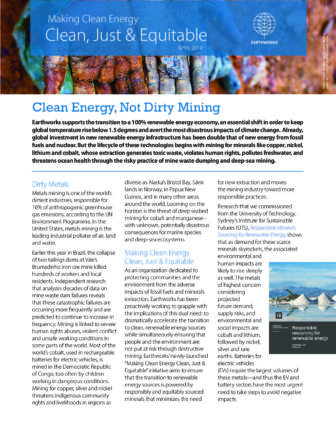Clean Energy, Not Dirty Mining
Earthworks supports the transition to a 100% renewable energy economy, an essential shift in order to keep global temperature rise below 1.5 degrees and avert the most disastrous impacts of climate change. Already, global investment in new renewable energy infrastructure has been double that of new energy from fossil fuels and nuclear. But the lifecycle of these technologies begins with mining for minerals like copper, nickel, lithium and cobalt, whose extraction generates toxic waste, violates human rights, pollutes freshwater, and threatens ocean health through the risky practice of mine waste dumping and deep-sea mining.
Dirty Metals
Metals mining is one of the world’s dirtiest industries, responsible for 10% of anthropogenic greenhouse gas emissions, according to the UN Environment Programme. In the United States, metals mining is the leading industrial polluter of air, land and water.
Earlier this year in Brazil, the collapse of two tailings dams at Vale’s Brumadinho iron ore mine killed hundreds of workers and local residents. Independent research that analyzes decades of data on mine waste dam failures reveals that these catastrophic failures are occurring more frequently and are predicted to continue to increase in frequency. Mining is linked to severe human rights abuses, violent conflict and unsafe working conditions in some parts of the world. Most of the world’s cobalt, used in rechargeable batteries for electric vehicles, is mined in the Democratic Republic of Congo, too often by children working in dangerous conditions. Mining for copper, silver and nickel threatens indigenous community rights and livelihoods in regions as diverse as Alaska’s Bristol Bay, Sámi lands in Norway, in Papua New Guinea, and in many other areas around the world. Looming on the horizon is the threat of deep seabed mining for cobalt and manganese–with unknown, potentially disastrous consequences for marine species and deep-sea ecosystems.
Making Clean Energy Clean, Just & Equitable
As an organization dedicated to protecting communities and the environment from the adverse impacts of fossil fuels and minerals extraction, Earthworks has been proactively working to grapple with the implications of this dual need: to dramatically accelerate the transition to clean, renewable energy sources while simultaneously ensuring that people and the environment are not put at risk through destructive mining. Earthworks’ newly-launched “Making Clean Energy Clean, Just & Equitable” initiative aims to ensure that the transition to renewable energy sources is powered by responsibly and equitably sourced minerals that minimizes the need for new extraction and moves the mining industry toward more responsible practices.
Research that we commissioned from the University of Technology, Sydney’s Institute for Sustainable Futures (UTS), “Responsible Minerals Sourcing for Renewable Energy,” shows that as demand for these scarce minerals skyrockets, the associated environmental and human impacts are likely to rise steeply as well. The metals of highest concern considering projected future demand, supply risks, and environmental and social impacts are cobalt and lithium, followed by nickel, silver and rare earths. Batteries for electric vehicles (EVs) require the largest volumes of these metals—and thus the EV and battery sectors have the most urgent need to take steps to avoid negative impacts.
The Opportunity
We have a timely opportunity to scale up our dependence on clean, renewable energy sources, while scaling back our dependence on dirty mining. Doing so will require a concerted commitment from businesses and governments and consumers to:
- Boost Recycling and Minimize Toxicity: Manufacturers of electric vehicles, renewable energy (RE) and battery technologies must dramatically scale up their use of recycled minerals. Policymakers must create incentives for minerals recycling and requirements for companies to take back their products at the end of their useful lives. R&D innovators must design batteries and RE technologies for disassembly and efficient recycling of all the minerals they contain. Materials used in manufacturing should avoid toxicity. Health, safety and protection for workers and communities must be the top priority at recycling operations.
- Ensure Responsible Minerals Sourcing: Utilities, purchasers and manufacturers of RE technologies, batteries, and electric vehicles must trace the minerals in their products back to the source. Where sourcing from mining operations is absolutely necessary, purchasers must insist that those operations adhere to stringent environmental and human rights standards (such as those developed by the multi-stakeholder Initiative for Responsible Mining Assurance) with independent, third-party assurance of compliance.
- Shift Consumption and Transportation: The UTS research underscores the need to fundamentally rethink how societies (particularly wealthy ones) consume energy and products, and transport goods and people. It will take more than technological fixes to wean ourselves off fossil fuels and ensure equity in access to the benefits of clean energy. Policy makers should prioritize investments in electric-powered public transit, support bike and pedestrian-friendly policies, and expand access to public transit to those who are not currently gaining the benefits of today’s car-centric transportation system.
This is a moment for civil society allies to come together. As we pursue our necessarily ambitious climate goals, we must collectively ensure that human rights, community health, water, and ecosystems are protected against dirty mining. We have a historic opportunity as renewable energy campaigners, mining activists, frontline communities, sustainable transportation advocates, labor representatives and environmental NGOs to collaboratively ensure that our fossil-fuel-free future is truly clean, just and equitable.
For More Information
The UTS-ISF report Responsible Minerals Sourcing for Renewable Energy:
Earthworks’ Making Clean Energy Clean, Just & Equitable:

